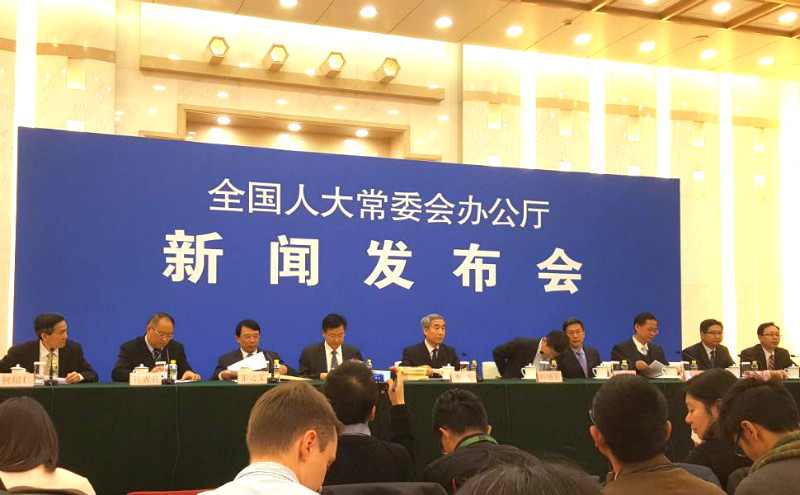
- Wall Street Journal reports that China's top legislative body effectively barred two Hong Kong politicians from taking office as local lawmakers in a decision that overrides Hong Kong's legal authority. The Standing Committee of China's National People's Congress on Monday ruled that people elected to Hong Kong's legislature can't be allowed to retake their oaths of office if their first attempt is deemed invalid, according to a statement.The decision was "necessary" to protect the "dignity" of Hong Kong's legal system, Zhang Rongshun, vice chairman of the NPC Standing Committee's legislative affairs commission, was quoted by state media as saying.Hong Kong started legal proceedings Thursday over whether its legislature should allow two politicians who advocate greater Hong Kong autonomy to take office, after the pair staged an anti-China protest at their swearing-in ceremony last month. Beijing's interpretation of the relevant provision in Hong Kong's Basic Law would supersede any local court ruling. Hong Kong lawyers have voiced concern that such an intervention would undermine the city's semiautonomous status.
Wall Street Journal reports that Beijing is considering allowing Wall Street firms to run their own investment-banking businesses on the mainland, according to people briefed on the discussions, a long-awaited step that would give them more access to China's hard-to-crack domestic market. The move is being discussed as part of a new U.S.-China trade and investment framework. Firms such as Goldman Sachs Group Inc. and J.P. Morgan Chase & Co. potentially could operate investment-banking business in China on their own. Currently, the firms must pair with domestic brokerages in joint ventures. The people briefed on the discussions caution negotiations aren't finalized. Details need to be hashed out with Chinese regulators, and any agreement would need to be ratified by the U.S. Senate.
- Bloomberg comments that no matter who becomes the next occupant of the White House, it's already clear that it will be tougher for Chinese companies to make acquisitions in the U.S. and elsewhere in the West....The U.S. has always been a tough market for China...opposition is moving beyond military-related, energy and infrastructure purchases...The U.S. push-back has even expanded into so-called soft power like media...Opposition isn't limited to the U.S., either...Chinese bidders are going to have to either narrow their focus to targets in other parts of the world or focus on minority stake purchases if they want to keep buying overseas...Though unlikely to fizzle, China's M&A boom is definitely beginning to sputter.
- 2016-11-04 China’s Wanda Group to Buy Dick Clark Productions for About $1 Billion
- 2016-11-03 China Slowdown Deepens Looming Pension Crisis
- 2016-11-02 Separatist Hong Kong Lawmakers Draw Blunt Response From China
- 2016-11-01 After U.S. Election, Expect Hardening on China
- 2016-10-31 Made in China: Once known for cheap knockoffs, Chinese companies are now world's innovators
- 2016-10-30 Russia Welcomes Growing Wave of 'Red Tourists' From China
- 2016-10-28 Philippines says Chinese ships have stopped chasing Filipino fishermen from contested shoal
- 2016-10-27 China's Xi anointed 'core' leader, on par with Mao, Deng
- 2016-10-26 Xi’s Agents of Fear Keep Party on Edge in Anti-Graft Fight
- 2016-10-25 Duterte Looks to Reassure Skeptical Japan Over China Ties
- Wall Street Journal US To Launch New Chinese Steel Probe
- Forbes U.S., China Rushing Investment Treaty At End Of Obama Term
- Reuters Exclusive: Singulato is China's latest e-car newcomer to rev up with big f...
- Reuters RPT-AIRSHOW-After stealth fighters and jumbo jets, China's 'secret weapon'...
- Bloomberg China's Moves to Cool Property Prices May Be Working
- USA Today Thousands protest to support Hong Kong pro-independence duo
- Forbes China's Domestic Travel Scene Gets Upgrade With Luxury Family-Centered Venues
- The Telegraph World currency markets brace for China reserve shock
- Reuters Pandas back home in China from US stint
- Financial Times Sony sued in China for patent infringement
- uk.reuters.com China launches 10 bln euro fund for Central, Eastern Europe
- Fox News China says it must act to deter Hong Kong separatism
- Reuters China Premier Li says economy to maintain steady growth
- Bloomberg China's Gift for the Next President
- The Washington Post The coming clash with China over North Korea
- Financial Times Why some in the Chinese elite plump for Trump
- www.nbcnews.com Trump vs. Clinton Battle Turning Heads in China
- nationalinterest.org What are the Philippines and Malaysia Doing When It Comes to China? (It's Called Bandwagoning)